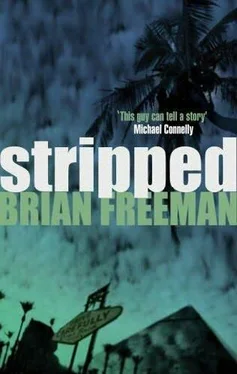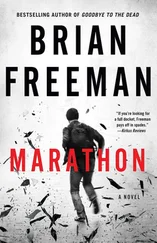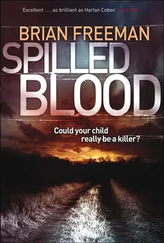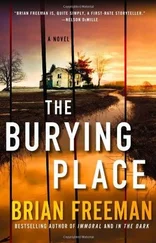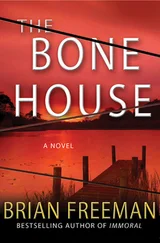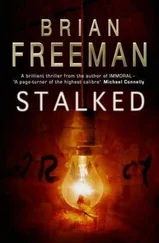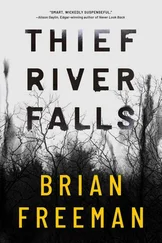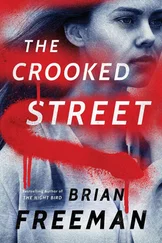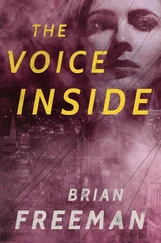He studied the mirrors one last time and got out of the car. The SIG-Sauer was almost invisible in his right hand.
As he walked up the driveway, he felt a glimmer of hesitation, which he tried to quell. Then he understood-he knew her. In almost every other case, he had faced a stranger, whose story he didn’t know, but he had been with her and liked her. She seemed lost, a victim, a little like himself. He came up to the oversized front door, rich with wood and brass, and thought how small she seemed in these giant surroundings.
It didn’t matter in the end. Everyone was a victim sooner or later. That was what the voice in his head said, the one that had always been there, guiding him.
Amira.
He rang the doorbell. A few seconds passed. He grew uncomfortable, bathed in the porch light. His gun was sheltered behind his right thigh.
She labored to open the door, and when she did, she smiled at him, recognizing him. There wasn’t any fear in her face.
“Oh, hi,” she said in her girlish voice. Pretty. Vulnerable. “Didn’t you get the message?”
Those were her last words. When she saw the gun, she only had an instant to become confused and then afraid, and then it was over. You couldn’t afford to hesitate when you had any doubts. Ten seconds later, he was back in the Lexus, with the windows open to disperse the acrid smell of smoke, driving back toward the hills that led into the city.
Serena ordered a bottle of sparkling water and a champagne glass. She found a table for two near the stage and tipped the waiter twenty dollars to remove the other chair.
She hated being in a casino by herself, where she had to fend off drunken passes all night and watch drinks being poured that reminded her of what she couldn’t have. But Stride had suggested that Boni’s daughter, Claire, might respond better to her, one on one in the casual setting of the club, than to the two of them together.
The Boulder Strip casinos mostly attracted locals, people in the know, who assumed their odds here were better away from Las Vegas Boulevard (not likely) and that they could be higher rollers with more perks on a smaller stake out here (true). Serena knew that Cordy was a fixture at Sam’s Town, the largest of the Boulder casinos, a few miles to the north. He poured thousands of dollars into their greedy hands each year, but they treated him like a king in return.
The joint where Claire sang, called the Limelight, wasn’t in the same league as its bigger cousins like Sam’s Town, Arizona Charlie’s, or Boulder Station, and didn’t include an attached hotel. It was on the deserted southern end of the highway, where there were still acres of dirty, open land, interspersed with RV parks, adult superstores, and pawnshops. A few housing developments had begun creeping in at the edges, as the suburbs expanded their hold on the desert.
The Limelight had been recently renovated over the skeleton of a long-shuttered roadside casino, a beer-and-nickels joint where fights used to break out nightly and down-on-their-lucks gambled away their last few dollars. No one was sorry to see it go. The Limelight wasn’t upscale, but it was one of the few venues in town that featured live country music for the price of a couple of drinks. She and Stride had dropped in a few times. It was barely more than a bar, with a matchbox gaming room for tables and slots and a claustrophobic showroom with green walls, a long bar with video poker machines, and about fifty circular tables squeezed without much breathing room in front of a narrow stage.
She sipped her water and watched the tables filling up quickly. Claire Belfort obviously had a reputation. Anyone could fill the club on Saturday night, but it was Tuesday, and that meant the crowd was coming to see her. Serena had been ready to assume that Boni’s money had paved the way for his daughter’s career, but now she wasn’t so sure. The Limelight was a dive, but the people who came to the shows knew music.
At nine o’clock, Claire’s band took their places. It was a typical country arrangement, with fiddle, bass, drums, and steel. The lights went down in the showroom, and overhead cans lit the stage. The band opened with a keening, melancholy tune, and Serena recognized it immediately as one of her favorite songs: “You’ll Never Leave Harlan Alive,” a bitter elegy about the plight of Kentucky coal miners. Serena had heard Patty Loveless sing it, and Patty was a tough act to follow.
Then, from offstage, she heard a smoky voice wrapping itself around the lyrics and weaving all the pain in the world into the music. Claire’s voice could have stood up to the demands of the blues. It was strong and filled with emotion, but with a nuance in her expression that Serena had only heard in the most mature country singers. She sounded a little like Allison Moorer, with a voice so sorrowful and hypnotic that Serena found it arousing to listen to, and irresistible, like one of the Sirens.
Claire walked into the light from the corner of the stage. She kept singing, as applause erupted and then turned into a hush as people listened to the song. She had long, strawberry blond hair, with wavy ends that swished around her shoulders. Her face was angular, with hard edges and dimples in her cheeks, and a small birthmark in the hollow of one dimple that made her face both imperfect and attractive. She had piercing, intelligent blue eyes. She wore an untucked pink silk shirt, with its top three buttons undone, black pants that clung to her slim legs, and razor-thin stiletto heels. Light glinted on her gold hoop earrings.
She came to the very front of the stage, directly above Serena, singing a poignant story about a grandfather in the nineteenth century who went back into the coal mines to feed his family, only to die there like so many others. The music was haunting. Serena found herself staring up at Claire on the stage, enraptured. Their eyes met, and a strange, electric sensation passed between them. Serena passed it off as her imagination, but it felt real and intense.
When the song ended, with Claire whispering the last few lines over and over like a ghost, Serena found herself on her feet, applauding. She saw the flush in Claire’s face and the way she thrived on the energy of the crowd.
Claire moved on to another country ballad and followed it with a rockabilly foot-stomper, then a medley of bluegrass covers. All of them were sad songs, with lyrics about loss and surrender and death, the kind of song that would ring false with a lesser singer. Claire brought them to life, made them real and sorrowful. In every tragedy she sang about, she found an inner longing that Serena could relate to and remember.
Her eyes kept coming back to Serena. Speaking to her. Teasing her. This wasn’t Serena’s imagination. When they looked at each other, Claire’s lips would crease into a small smile, not of humor or irony but of kinship. It was almost as if Claire were singing to her. Or that was how it felt.
Serena found herself being seduced.
It was a sensation from long ago that she hadn’t felt for years. She wasn’t drinking anything but water, but she felt drunk anyway. The music and smoke made her light-headed. Claire’s voice felt like soft hands on her body, and Serena felt naked and exposed.
It was electrifying.
An hour later, Claire opened her dressing room door with the same dark smile. Her skin glowed with sweat from her performance. Her eyes, seeing Serena, were bright and curious.
“I’m Serena Dial,” Serena told her. “I’m a homicide investigator with Metro. I’d like to talk with you.”
Most people folded and became putty hearing what she did. They started spilling years-old secrets. Claire just arched an eyebrow to show her surprise and opened the door a little wider, so that Serena could squeeze past her.
Читать дальше
